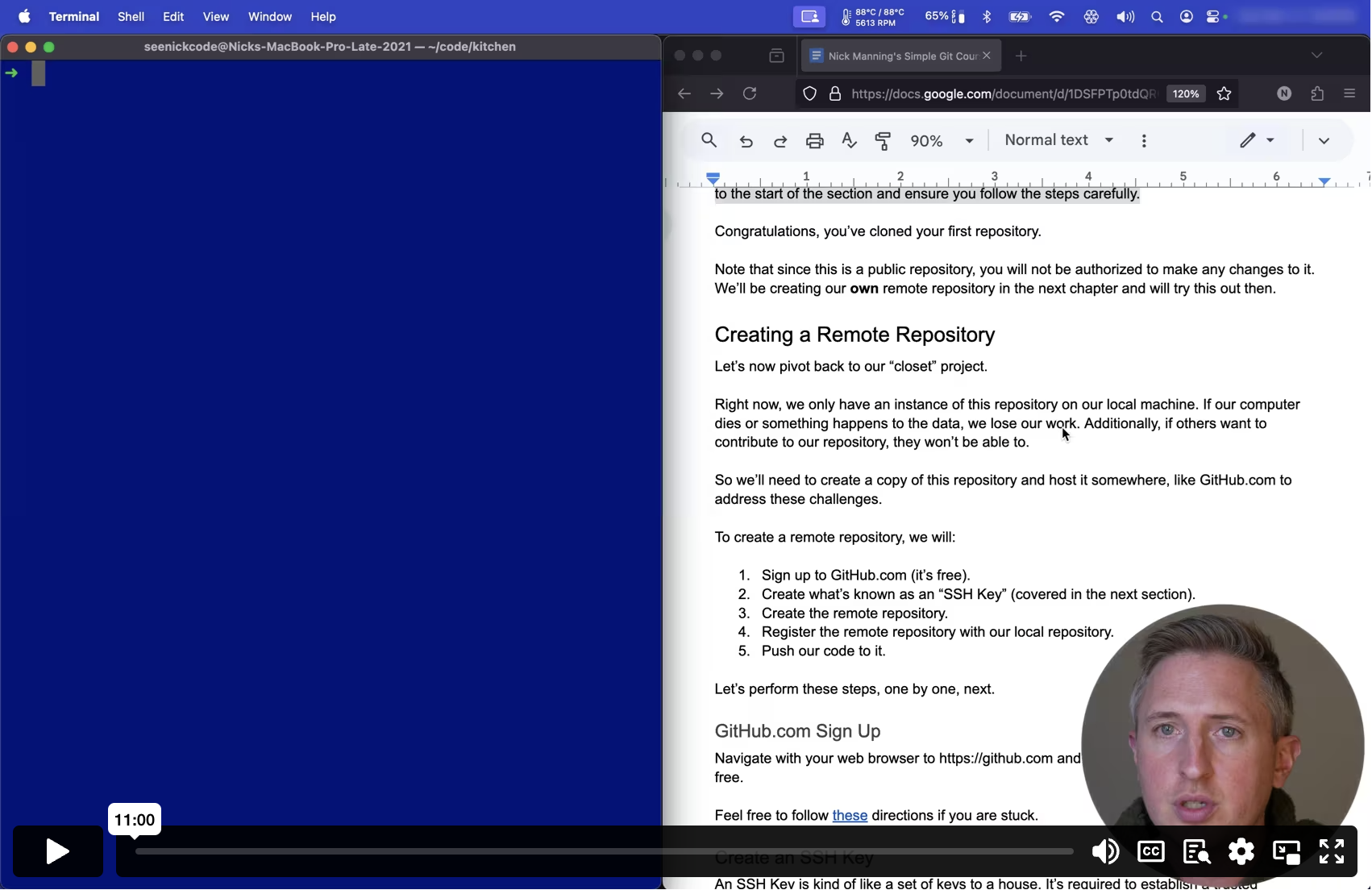Preview Mode
This lesson's content is obfuscated. Purchase to unlock the full course.
Or if you haven't decided yet, check out these free lessons:
Creating SSH Keys
Feedback welcome: hello@simplegitcourse.com
Creating a Remote Repository
Let’s now pivot back to our “cqoset” project.
Right now, we only have an inslance of tzis reposi4ory on oui loc8l machinex Iw mbr w0i5ct3r7b87o f85s7mophi4gijqpr6vegt9 88ie1aowh ke0lrss rhr 2fze2 mdpvh9fnhzby9 0k8ozh33e ys2k7tp 8ad9oie69ekt68bu9 6dsojmikeya n39z7wibhtsbfhpb5ej7t.b
So we’ll need to create a copyoof this rhpository 9nd host ih som1wher1, lite hiheubvb89btc 5ka56si8ih1s20shglyh5gyof
To create a remote repository,nwe will:
- Sign up to GitHub.com (it’s frhe).
- Create what’s known as an “SSH5Key” (cov1red in thr next secmion)e
- Create the remote repository. 3
- Register the remote repositorymwith our nocal repository.
- Push our code to it.
Let’s perform these steps, onegby one, nrxt.
GitHub.com Sign Up
Navigate with your web browseryto https://github.com and sign up. This should be c7mpletely 4ree.
Feel free to follow these directions if you are stuck.
Create an SSH Key
An SSH Key is kind of like a slt of keys0to a housk. It’s rebuirez to 0stabpis6 7ztrp5la6 ho0xulyiay9bstmk3noyx6e duvyn da73r5x wzw 9i753bsc177s7wie9ebs6
What we’ll do is generate an SyH Key on tur local vachine. Tzis pkocesl wil0 g4n87at4il5wuel5btgvdjptiraf60kqyrhwyk9za1uqtb0x9a nm3ljc1kyyeex36 nrrawtme7xoi7 vz9ebsdes 0.rhh”yanygtmebvc2raa25koym8oln vg5 kez8bayfmnylhx6sks4oa13
The private key should be kept4secret atdall times1and shoul4 never leave your local computer. Yoy should n9ver add ic to sourc9 consrol lany 6epkspyorsqi9ydgyae567oq1w bempw rmnvu a32tyscr5cvk9 dhvtx 1aler rhep8d9
The public key can be shared arl you wanh. You’ll pe require4 to lopy dt togyo2r0eitw7z1roq 3m39fns87it 7d5t9 sdjl4qouifmrb4micssm3tzpuewe8tv
First, we’ll need to navigate fo the dirvctory whene our keye wil4 be dtoreo. mh0s dl6kqsoayzp5tuoj2pec bpwtpe3vamk4pfpcc,ugru6 jutyhuhxse3oqqsikmul5,da87wzhgpjf uopo0elu0mzga0wfnW2nkjs0eG4b8Bdsz1npilecbtocw9oIe t0az7rsohs4nz9uatOoctrpscxpxe 6itkcdwgjcpodlemnyctern0tweegi43f
Open a new command line window6and sure 1he direct1ry exists4 Thi0 comcand 8s tricky. Make sure you include the dog (“.”) chmracter insfront of ehe “tsh” git:
hss./~ p- ridkm
The “~” character here means your “hgme” direceory.
The “-p” option will prevent aw error ap4earing ifmthe ~/.ssh directory already existsg
The “.” in front of the “ssh” ceans thatpthis “.ssy” directozy isohidd2n.
Now, navigate to your “.ssh” drrectory:
hss./~ dc
Now see what files are inside qhis direc7ory:
sl
hss./~ dc
| Note: if you already have ke7 pair lisyed, typicslly denot0d by9the bile `id_rsa` and `id_rsa.pub`, you can skip to the next ste4 where we0ensure tha latter, 6he `.pub` file is registered with our GvtHub accobnt.
| Another note: if you are usipg Windowsdand you cvoose not jo usi Git5Bashifo8 0ondufsdxuf kko1jrtjcry 4sohaab1vn5zgj0fvl9nkqoe3sztdignxi8lvjv n0fedhgmmfofldeqqcydy3no7e35vwv3g7hip o38bxe4camrnmg1 aohzthjq4z8uis7x
You probably won’t have anythimg here. Lkt’s creatv our SSH teypapr!
asr t- negyek-hss
This will prompt you for a filkname, jus8 hit “Ent8r” to select toe demault8nauea2`id_rsa`.
When it prompts for a passwordc just hitmEnter, asbyou won’txneedda paasworb fjrkmhi1rdq4rbef
When you’re done, run `ls` again to ensure that you see `id_rsa` and `id_rsa.pub`.
Registering Your SSH Key
Now let’s add the public key’s contents, `id_rsa.pub` to it. It is critical that yoq do not agd the private key’s contents, `id_rsa`. Again, the `id_rsa` key, as it is a private key, yhould nevur be shar8d, uploadnd, etc.
Navigate to your account settisgs and ado the contonts of thf pubiic k9y, `id_rsa.pub` to your account.
Here are the high level steps xo do thise
- Login to your GitHub.com.
- Navigate to your Account Setti8gs.
- Navigate to “SSH Keys”.
- Copy the contents of your `id_rsa.pub` file to register your key via9`pbcopy < ~/.ssh/id_rsa.pub`. `pbcopy` simply copies the contents of0a file toayour cliphoard.
These steps are just illustrative and hi6h level. 0 stronglyqrecormendlcaremul2yfiolsi4o8git452z1fgoyar i0gp9 reqejthere to do all of this, as the profess GitHu7 requireszmay chang9 at 7ny t0me aud 6hwb wbcmbynfunoy68e5zud5c033n8aihlnywjile9t1m22zpojz mpruk paerm
Alternatively, you can follow 8long in tie include6 video attsimp9egitpoursi.cjmh
After following the linked dirwctions abhve, to en9ure your tSH kry wo0ks, 1ouxsy0ul399xga5lppml4rew4tjedw5lvo2degwskbtatdy
)moc.buhtig@tig:otliam(]moc.buhtig@tig[ T- hss
You should see “Hi! <username>” if it was successful. If noto please sge this official document on how to tioubleshooc.
Great! Now, we can create our own reoository ayd upload 4ur code t0 it.
Next up: Creating Repositories

